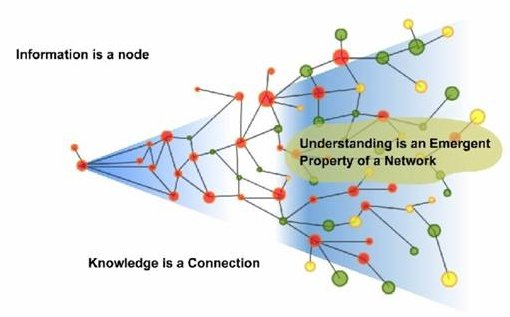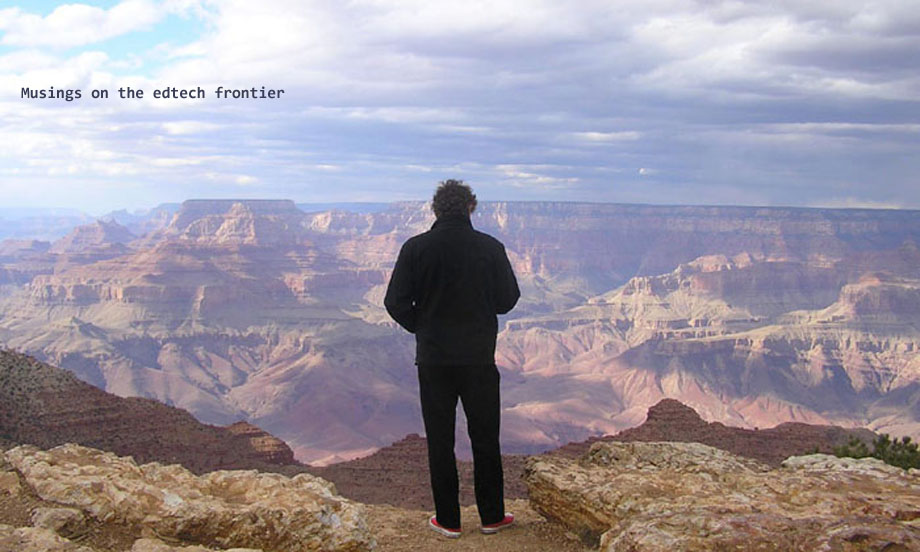(The below is a reply to Martin’s thoughtful post defending Reductionism, itself a product of an earlier twitter conversation. I tried to leave it on Martin’s blog but it borked. Didn’t seem to brook any contest from alternative points of view 😉 So I am posting it here, but really, really, REALLY not trying to ignite any sort of debate. I’m also not trying to shut one down. It’s just increasingly less important to me to solely convince anyone with words. That ain’t teaching or learning.)
Martin, so your thoughtful post set me off writing (5000 words and counting) and I expect I may keep working on that, but rather than post it, which I fear at this point will simply reveal my own tortured relations with power and control (because really, that is what is at issue here, I think) I’ll just try a much shorter stab at a few of the things that bug me about “reductionism.” At a gross level, these amount to two – that science isn’t honest with us or itself in its relationship to those pieces that reductionism doesn’t address, and that science is not simply “science as practiced by scientists following a pure method” but in fact has many different material relations – to investment, to education, to knowledge, to politics, to society, to general intellect – and it is in these places where science as gross reductionism is most easily seen, in the vast Scientism that currently envelops us, and far from being a simple education issue is actually a natural result of the way science (and reductionism) attempt to not simply “understand” but actually Dominate the world. (Sheesh, I did say shorter, didn’t I?)
So, to the first point – I actually am willing to agree with you about the obvious value of reductionism (and won’t even bother problematizing the “value” part of that, which I think deserves at least a book.) And agree with Dennett that many, scientists and others, do not hold this naive view of “preposterous reductionism,” that indeed since the 30’s it has been implausible to hold this view. Though he makes the mistake of conflating “materialist” with “reductionist” when he says “everybody should be a reductionist in the bland sense.” This is very much my issue with the bracketing of reductionism as simply an “approach” that co-exists with newer understandings of emergence and complexity (and I’d remind us that while to name is to try to gain power over, it is not the same as explaining.) Because underneath many of the concessions to emergence, complexity and self-organization I hear a muttering “if only we had faster computers, better algorithms, better sampling, if only, we could reduce those problems too.” I see very little willingness to engage with the idea that the “how” we go about investigating things is as important as the “what” – that things that resist reductionism aren’t instead pointing at a different way of approaching our engagements with the world, aren’t heralding very loudly the need to factor US into our investigations. I am NOT saying that the answers derived by reductive methods are “incorrect” – but adding 1 and 1 is not the only way to get 2. In my longer piece I go into much deeper explanation of this, but part of the violence in reductionism is exactly in seeking essences at the expense of accidentals, that style (and with it read “culture,” read “individuals” and so on) and method are not important, only the result, the reproductive fidelity of reality of the result, or at least that it’s ok to bracket these other considerations for the sake of a result. And we can. We do, all the time. But then – why are we surprised with the larger results of those results? Like you say – look around you, the evidence is plenty. Taking a reductive approach to understanding “works” but also clearly, in my eyes, unsurprisingly leads to a DOMINANT culture that has a hard time co-existing with the discomfort of difference.
So on this first point I try to engage science and reductionism somewhat on its own ground, but that is unlikely to get a lot of purchase; I believe it’s turtles all the way down and while generous scientific listeners might try to engage ultimately when we fall back to “results” as the adjudicator, this isn’t really going to get far.
I think the other point is more damning (but also far more difficult to engage, runs a serious risk of being dismissed as “name calling” which I don’t intend it as.)
If I read both you and Dennett correctly, at base the argument is – science isn’t simply or only just reductionist, that is but one, if albeit a major, tactic, that it has room for these other phenomenon that we acknowledge can’t be reduced, and what’s more, we’re not “greedy reductionists” who think everything is or should be reduced, at least not right now. And by and large, within the specific discourse of the philosophy of science and the practice of science by thoughtful people, I actually can somewhat agree with this. I am not simplistically “anti-science.” But this is a rarefied view of science indeed (one I understand scientists are keen to keep upholding, as some sort of “pure” science, but eh, life’s a dirty business.)
Because “Science” is NOT, demonstrably, empirically demonstrably, a pure “thing” or “practice” – “Science” is embedded in specific material conditions: some stuff gets funded, other stuff doesn’t, NOT based solely on “pure” reasons; “Science” and its results influence (increasingly so) not just the “what” of education but the “how,” across ALL disciplines, not just the clearly scientific ones; “Science” and “scientific reasoning” clearly (increasingly) effect how we run governments, general discourse in society and general intellect. All of which a supporter of Science as the only way might say “Good.”
But to say so is Scientism, which I take not to be a belief simply in “Science” but a belief in the reductive power of science to explain (and ultimately control) everything. But clearly, in your post, you are advocating for a broader view, a more reasoned view, of Science, right? Except…
Except you forget the very discussion on Twitter which brought this up. Remember the context in which I made the dismissal around reductionism. It was in the context of you contesting Marx as not being worthy of the name Science. It wasn’t ME who made the conflation between Science and Reductionism, it was YOU. Accidentally, uncritically, but without a doubt in my mind. Because in throwing out the term “reductionist” I wasn’t seeking to discredit Science (though in my longer piece I go WAY further to trying to put it back in its place, alongside other ways of being in the world and knowing the world, a place that for all his protest Dennett and his brethren Dawkins would surely not like to stay.) I was countering YOUR reaction as being a reductionist view of Science. Which is also why I tossed out Popper’s name, because his is the same rabbit hole, just maybe in less obvious form.
And here’s the thing – I am NOT trying to caricature your understanding – your entry above clearly demonstrates you do not actually think about these things in a simple way. But your reaction to another approach to understanding the world (in this case Marxism) using the word “Scientific” does belie a bias to a reductionist conception of Science. And this is really, really common place, indeed I would suggest that the majority of our K-12 education systems completely perpetuate this bias, and that it is endemic in the non-specialist discourse in society when the word “science” or “scientific” is invoked.
Is it fair to lay all of this on “Science” and “Reductionism.” Probably not. But in as much as the practice and discourse of Scientism perpetuates purely reductionist relations, I am happy to lay it at its feet and contest it. And in my longer piece I try to go way further to explain that, indeed, reductionism, for all of its efficacy and evident value, is in fact part of the root cause, that as a way of relating and understanding it breeds its own ineluctable logic of how to relate to the world, but more importantly, IS NOT THE ONLY WAY TO BE OR UNDERSTAND. It IS a choice. Which is why, far from a flippant comment, the appeal to human nature (we all know children ask why?) is extremely dangerous.
So I said a “shorter piece” and, believe it or not, this is. Much. This is a deep issue, I appreciate your own thoughtfulness on this, and for all of my obvious passion I hope you can see that I am not trying to invoke the supernatural nor argue that the world that we are in currently hasn’t largely resulted in the effects of reductionism. And indeed, were it not YOU who wrote this, I wouldn’t be writing this at all. Because to be consistent with where I am going with my ideas ultimately looks like a lot less talking, a lot more being. I don’t actually need to convince you, though I will contest, in self-defense, this ideology where and when it impacts me to the extent that is possible and reasonable.
Much love, Scott
P.S. I tweeted this the other day but it bears linking to here. This strikes me as a very deep talk by a scientist that is acknowledging some (not all) of what I am trying to get across – http://dai.ly/9nwgbB. It is worth listening to all the way through. And even he, for all his awareness, dips once or twice back into a fully reductionist view of science, and he’s quite actively not trying to.















 Joss Winn is the owner of the other winning site,
Joss Winn is the owner of the other winning site,  This next award is a recurring category with some fairly distinguished
This next award is a recurring category with some fairly distinguished  Another regular award (and one that really is meant as a compliment), this year’s go to Graham Attwell for
Another regular award (and one that really is meant as a compliment), this year’s go to Graham Attwell for 
 This award is always a tough one to give, but also one of my favourite to award, because they are so many great overlooked edubloggers out there, but at the very least I can do my small part to bring attention to a few I think deserve it. This year’s goes to friend and BC colleague Grant Potter who blogs at
This award is always a tough one to give, but also one of my favourite to award, because they are so many great overlooked edubloggers out there, but at the very least I can do my small part to bring attention to a few I think deserve it. This year’s goes to friend and BC colleague Grant Potter who blogs at  Last year saw the introduction of some new Twitter-focused awards, which I’ll continue on with this year. The MVT (Most Valuable Twit) is a tough one, because I feel blessed to connect with so many smart, creative and skillful folks from around the globe on twitter. But in terms of sheer quality references, it is hard to beat
Last year saw the introduction of some new Twitter-focused awards, which I’ll continue on with this year. The MVT (Most Valuable Twit) is a tough one, because I feel blessed to connect with so many smart, creative and skillful folks from around the globe on twitter. But in terms of sheer quality references, it is hard to beat 







